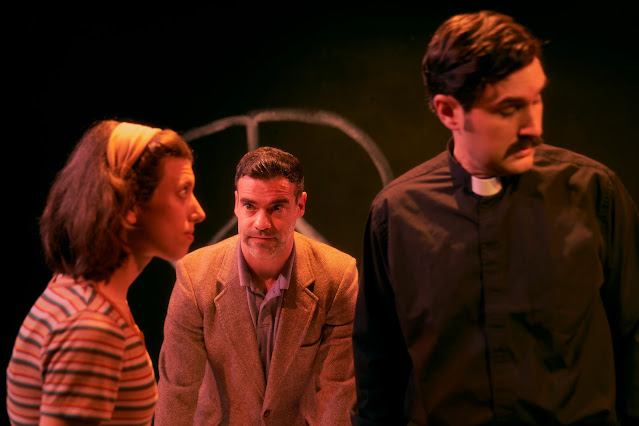Review: "Hidden": It Begins with Your Family but Soon It Comes Round to Your Soul
Hidden
Written and directed by Marc Weiner
Presented by The Playwrights’ Gate at the Chain Theatre
312 W. 36th Street, 4th Floor, Manhattan, NYC
May 11th-May 28th, 2023
 |
| Eileen Sugameli, Mark Friedlander, and Sean Edward Evans in Hidden. Photo by Shraya Kag |
Marc Weiner’s is one such voice. Weiner's new play Hidden presents interpenetrative narratives from the Warsaw Ghetto and Poland of the 1940s, and the Columbia University Vietnam War protests of 1968, and it draws analogues and contrasts between conflict, character, and obligation – all of which echo upon leaving the theatre and considering our own epoch.
 |
| Jon Lonoff and Emily Blake in Hidden. Photo by Shraya Kag |
Similarly, a small wooden box remains on stage throughout the play, across acts, countries, and time periods, serving as a metonym for the inescapability of history. Late in the first act, when the audience learns just what purpose the box initially served, the metaphor is deeply and darkly extended to the multidirectional presence of both trauma and intergenerational trauma.
 |
| Michael Lopetrone, Michael Gnat, Sean Edward Evans, Mark Friedlander, Jon Lonoff, and Eileen Sugameli in Hidden. Photo by Shraya Kag |
A nimble supporting cast rounds out the story’s rise and fall, with small groups of characters often playing out thematically relevant yet temporally distinct scenes in close proximity and simultaneity on stage. Michael Gnat and Jon Lonoff, as the interlinked patriarchs, both display a talent for both humor and darkness via monologue and dynamic paired scenes. Jakob's (Gnat) wife, Sarah, played by Emily Blake, provides a particularly resonant voice to the choir when she’s invited to return to Poland by her newly extended family. Her gracious yet firmly delivered reply deftly underscores the production’s commitment to both the value of family and the importance of self-preservation. Similarly, early in the show, Sarah’s brother – Sean Edward Evans’s Joseph (born Joshua) – anchors the felt pressures of Catholic duty and service in Vietnam, before an unexpected confrontation in the second act gives him the opportunity for a hauntingly controlled yet explosive exploration of the darker depths of his motivations.
In the end, the Jewish imagination returns, as it seemingly always does, back to ethics and the paragons of Jewish thinking. Back to Martin Buber. Back to Emmanuel Levinas. Both thinkers, in their respective ways, exalt the essential role of interpersonal relationships in ethical thought and praxis. Hidden offers us a path for recovering the past, albeit one that requires leaps of interpersonal love. The things that are hidden – personal and historical – are the things that tie us together, linking us as humans across oceans and generations. These greater, loftier reconciliations begin with love, as Weiner and his cast poignantly remind us.
-Noah Simon Jampol



Comments
Post a Comment